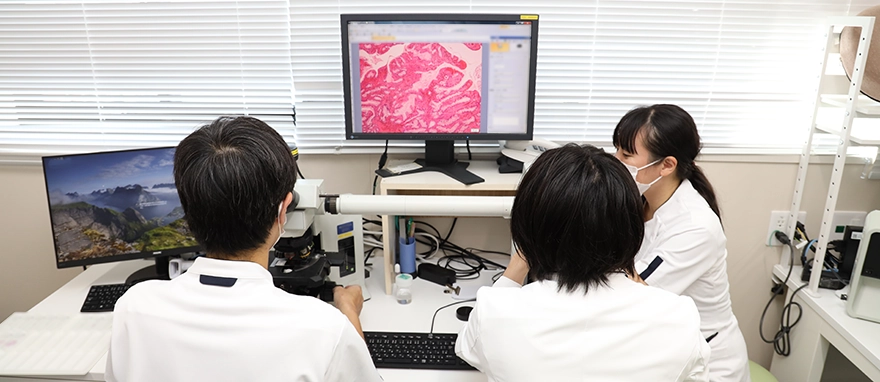Diagnostic Pathology

Introduction
My name is Yasuaki Tsuchida, and I serve as the Director of the Department of Diagnostic Pathology. As of April 2024, our department (Pathology Testing Center) is composed of a dedicated team of three full-time physicians, one part-time physician, and seven clinical laboratory technologists specializing in pathology. With strong teamwork, humility, and sincerity, we remain fully committed to delivering the highest quality of diagnostic services.
Characteristics of this department
Although we rarely meet patients directly, our department conducts detailed examinations of tissues (such as breast lumps), cells (such as cancer cells in urine or sputum), samples collected during endoscopic examinations of the stomach or colon, and all organs from surgical specimens. These examinations are carried out both visually and microscopically.
- Tissue Diagnosis : Approximately 3,000-3,500 cases annually ( * )
- Biopsy via stomach and colon fiber endoscopy, small tissue samples
Reported within 1 to 2 days - Surgical specimens, polypectomy, large tissue samples
Reported within 2 to 5 days
- Biopsy via stomach and colon fiber endoscopy, small tissue samples
- Cytology : Approximately 6,000 cases annually, reported on the same day or the following day
- Autopsy : 1 to 5 cases annually
* For rare cases or those requiring genetic testing, diagnosis is made in collaboration with the Japanese Society of Pathology and the National Cancer Center's Pathology Consultation.




Main diseases
We cover all areas.
Treatment
Although we are not directly involved in treatment, we believe that accurate pathological diagnosis leads to appropriate medical care.
A Case of Tissue Diagnosis
This image shows an H&E-stained histopathological specimen of a tumor located near the spinal cord. The pathological diagnosis is "atypical meningioma", which belongs to the meningioma group. While most meningiomas typically follow a benign course, atypical meningiomas require special attention due to their distinct histological characteristics.
As seen in this example, pathological examinations, including histopathological diagnosis, play a crucial role in determining post-surgical management for patients, making it an essential part of medical care.

Medical track record of the clinical department
- Histopathological examinations : Approximately 3,000 to 3,500 cases per year
- Cytological examinations: Approximately 6,000 cases per year
- Intraoperative rapid cytological and histological diagnoses: Approximately 60 cases per year
- Autopsies: Approximately 1 to 5 cases per year
- In-house Clinicopathological Conferences (CPCs): Approximately 1 to 5 cases per year
- Conference presentations (including the Japanese Society of Pathology and the Japanese Society of Clinical Cytology): Approximately 3 presentations per year
Medical equipment
Automated tissue embedding machine, automated H&E staining system, automated special staining system, automated immunostaining system, and automated formalin dispenser etc.
Academically certified facility
- A training facility accredited by the Japanese Society of Pathology.
[The Japanese Society of Pathology https://www.pathology.or.jp/senmoni/hospitals-touroku.html]
Regarding clinical research
Click here for more information on clinical research

